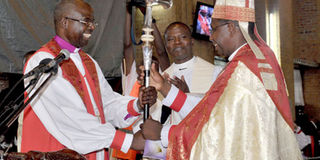When religious leaders resign

L-R, former Archbishop of Church of Uganda Henry Luke Orombi hands over leadership to Bishop Stanley Ntagali in December last year. FILE PHOTO
What you need to know:
End of service. Pope Benedict XVI resigned on February 28 last week. While it was a shock to many believers in the world, the resignation of a religious leader is often an eventuality prepared for. We sought to find out what it takes for our local religious leaders to resign.
When the pope announced that he would be resigning, becoming the first pope to do so in nearly 600 years, it caused shock and sparked debate on whether he was even allowed to do so. The laws governing the Roman Catholic Church allow the pope to resign and below we look at what the laws say about religious leaders resigning.
Roman Catholic Church
Canon 332:2, of the Code of Canon Law, the legislation that oversees the Roman Catholic Church, states, “Should it happen that the Roman Pontiff resigns from his office, it is required for validity that the resignation be freely made and properly manifested, but it is not necessary that it be accepted by anyone.” This thus grants a serving pope permission to resign if they so wished to do so.
The leadership of the Roman Catholic Church in Uganda is enshrined in the Uganda Episcopal Conference. The Conference’s chairperson, a post currently filled by His Grace Rev. John Baptist Odama, is the head of the Catholic Church in Uganda.
The Conference is made of the Bishops from the Church, in Uganda, and they elect among themselves, a chairperson who serves has a four-year term. The post is rotational, according to Father Philip Odii, the national executive secretary of Social Communications, Uganda Catholic Secretariat. The Conference’s chairperson can also be re-elected for another term, he added, and that they can choose to resign at any time they wish to.
Anglican Church of Uganda
The Anglican Church of Uganda is part of the Worldwide Anglican communion but it is semi-autonomous. According to the Canons of the Church of Uganda, the body of legislation that governs the Anglican Church in Uganda, “The Archbishop may resign at any time by written notice to the Dean of the Province, who shall thereupon submit the same to the House of Bishops.”
An Archbishop is the head of the Anglican Church in Uganda. “He is the presiding bishop of the Church of Uganda, and upon assuming this office, shall be the metropolitan of the Church of Uganda and Bishop of the See of Kampala,” the law reads.
The archbishop, who can be a woman or man, is elected from among the House of Bishops and must have at least reached the age of 50.
They can then serve until they reach 65 year of age, or until the 10 years in office elapse, or, until they resign, whichever comes first. Bishop Henry Luke Orombi took early retirement from his post, a full two years before his tenure was up.
In the occurrence that the office of the Archbishop becomes vacant, either due to illness or due to being incapacitated, the Dean of the Province shall have authority to perform all duties of the Archbishopric and shall be Acting Archbishop. The Dean of the Province is the most senior bishop among the house of bishops, as per the date of consecration as Bishop or ordination as Priest.
Islam
Hajj Nsereko Mutumba, the spokesperson of the Uganda Muslim Council, says unlike the Roman Catholic Church, Islam does not have a central head who reigns over all Muslims in the world.
“We do not follow dogma,” he says. “We have a mufti in Mecca and another at the Azari University in Egypt, who may issue a fatwa on a given subject, but our ultimate leader is the Quran and the Hadith.
He, however, says the Mufti, currently, Sheikh Shaban Mubajje, (although another faction has a rival Mufti, called the supreme Mufti, Sheikh Zubair Kayongo), is at the head of leadership of Islam in the country. Hajji Mutumba says the mufti can serve until the age of 70 years old, or until he resigns his post.




